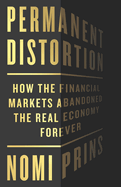
Readers curious about recent history and potential futures of the global economy will find much to capture their interest in Nomi Prins's Permanent Distortion, which is expansively researched, clear-eyed and conversational in tone. Prins (Collusion; It Takes a Pillage) argues that, since the 2008 financial crisis, monetary policy meted out by various central banks, including the U.S. Federal Reserve, has been the dominant means of economic stimulus. Though not without value and a boon to ordinary citizens in some respects, monetary stimulus, Prins asserts, is disproportionately beneficial to the very wealthy who possess substantial financial assets, rather than the vast majority of the world's people, whose material security stems largely from incomes and affordable, tangible goods and services.
The result is a global economy of almost parallel realities: the one in which most people live, and the highly financialized realm of capital speculation in which most corporations and the wealthy almost exclusively operate. As central banks have flooded capital markets with cheap credit and easy money--through an unprecedentedly long low-interest rate period and "quantitative easing," including trillions of dollars of bond purchases--the financial sector has grown immensely while becoming less accountable to vital democratic checks. Although she acknowledges that many emergency measures may have been helpful and even necessary, Prins is convinced that financial markets have cemented a new status quo that is less egalitarian and that is poised for a painful fall.
This comprehensive recent history is an informative and valuable work of observation, research, analysis and warning to financial experts and novices alike--and all who care about the structures of economic power. --Walker Minot, teacher, freelance writer and book reviewer

